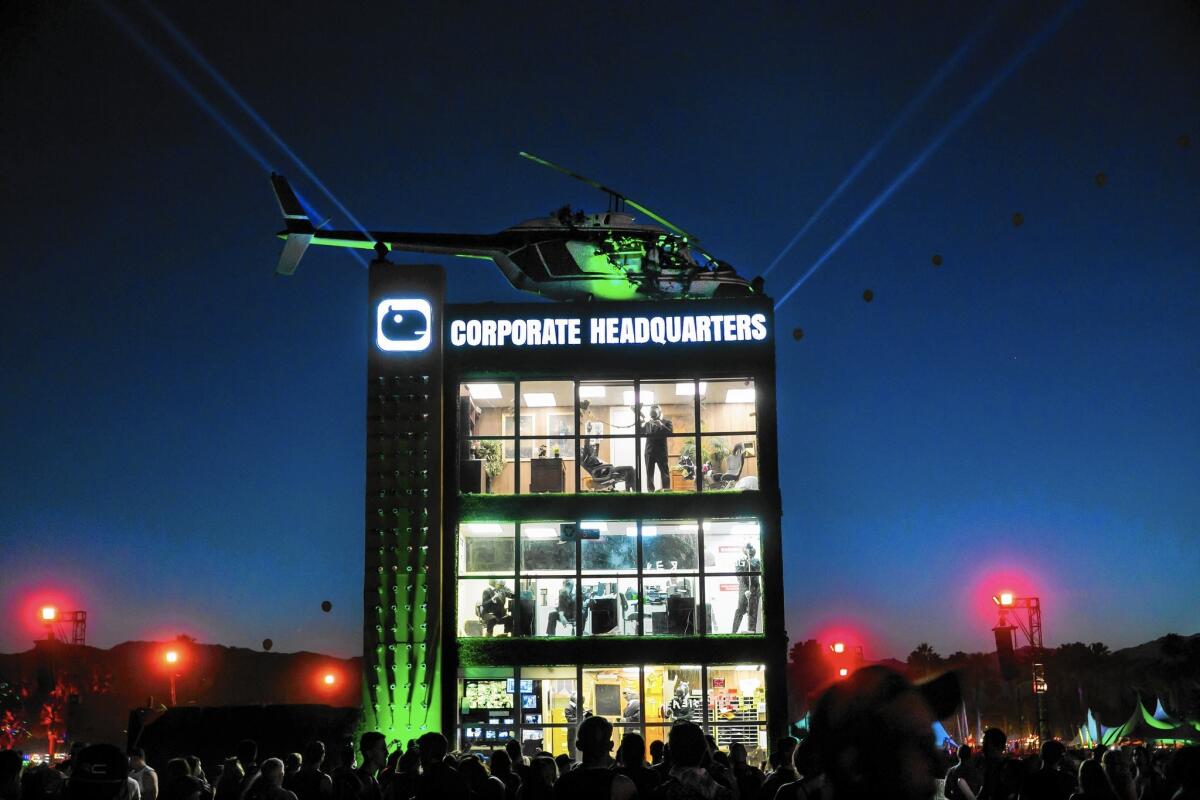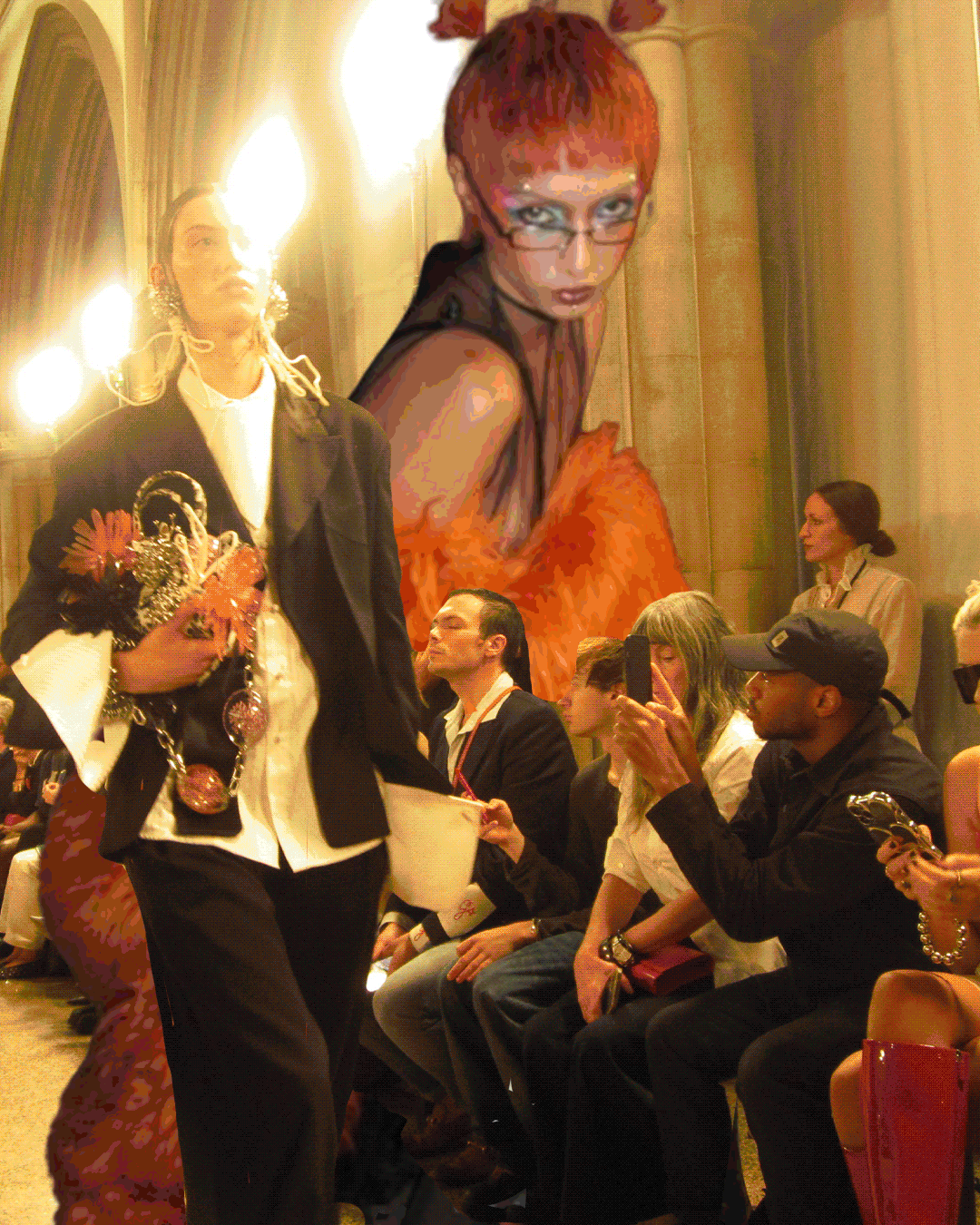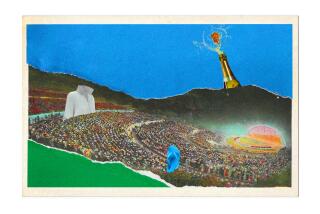Caution, hippos working: Inside Coachella’s ‘Corporate Headquarters’

- Share via
Reporting from Indio, Calif. — The wily performer smashed his equipment, rolled around on the ground and growled like a wild animal in front of a mesmerized crowd at the Coachella Valley Music and Arts Festival. The evening’s headliners, AC/DC, had a hard act to follow and would eventually prove tame in comparison.
The desert festival, which kicked off its second weekend Friday, features plenty of inspiring acts on multiple stages, but none is more dangerous and unpredictable than the hippos of the Corporate Headquarters.
A dozen actors dressed in latex hippo masks and business suits populate the performance art installation, a three-story-high, glass-windowed office building erected in the middle of Coachella’s Empire Polo Field.
FULL COVERAGE: Coachella 2015
Approximating the worst of office culture, grunting employees rummage wildly through file cabinets, smash malfunctioning printers, snort angrily into the phone, sleep under their desks and have “secret” office romances with one another. The CEO practices his putting skills on the top floor, a helicopter waiting for him (rotor spinning) on the roof above.
Like most workplaces, this sort of behavior goes on nonstop, 12 hours a day. Unlike most real offices, it all happens in full view of whomever happens to be watching from the field outside.
Reactions from those who viewed the hippos last week ranged from amused to confused to somewhat traumatized. “I haven’t even graduated from college yet,” one young woman said, “and this is making me worry about what comes next.”
The Corporate Headquarters is the work of Los Angeles-based artists Derek Doublin and Vanessa Bonet. It’s a brilliant comment on high-pressure corporate culture, the absurdity of the workplace and the base instincts of territorial company men.
“We like to let people come up with their own meaning,” says Doublin of the inspiration behind the Corporate Headquarters. “Most come up with way better explanations about why this thing exists than anything we could ever say.”
The high-stress hippos share the field with at least 10 other jumbo art installations. The art featured at the annual festival includes a big caterpillar (eventually replaced by a graceful, equally large butterfly) and whimsical strings of balloons.
“Coachella’s a place where they want their art to be psychedelic, trippy and very beautiful,” Bonet says. “We were nervous because office buildings aren’t necessarily cool or beautiful.”
“People go to this festival to escape responsibility, and then here’s this thing that reminds them of work,” Doublin adds. “We thought this is either going to work or it’s going to be really stupid.”
The installation is made of shipping containers stacked on top of each other, open down one side so pedestrians can ogle. Outside walls are camouflaged with fake grass (“We bought all that turf from Dollar Stores around L.A.,” Doublin says. “My credit card was frozen by the fraud department because who buys $3,000 worth of stuff from a dozen different Dollar Stores?”)
It’s that curious mix of high and low technology that made the installation one of the more popular sights on the field. The fully functioning offices inside the building juxtapose new computer monitors and smartphones next to aging, yellow file cabinets, simulated wood paneling and clunky push-button phones.
The artists called on the expertise of “mad scientist and robotics experts” friends to help make it all work. Printers are rigged to intermittently spit out paper in the style of a machine gun. Seventy-three intimidating security cameras outside of the building pivot constantly toward the crowd. Onlookers from the field can pick up a phone placed in front of the structure and converse with the hippos, if only one could translate the snorting responses.
It took about three months to build the Headquarters, then nine days to assemble it on the Empire Polo Field.
Intentional or not, the hippos also provide comic relief to the corporate culture that’s become commonplace at festivals and concerts.
Coachella’s formerly punk rock concert promoter Goldenvoice is now a unit of the Anschutz Entertainment Group, and the Headquarters shares festival grounds with at least two Samsung booths, a Sephora tent, a JBL headphones rest stop, an American Express VIP lounge and lots of Heineken signage.
Not to be outdone, the hippos advertise on the side of their building: Eau de Cologne Pond Water, a Fragrance for Hippos. If only retailer H&M could have bought that prime piece of real estate to advertise its “H&M Loves Coachella” fashion line.
Like many of the artists on the music bill, this isn’t the hippos’ first run at Coachella. They were introduced in 2013 via the Coachella Power Station, another performance art installation where the water-dwelling mammals were dressed in worker’s jumpsuits and operating, well, a power station.
The idea for the hippos debuted at downtown L.A.’s Art Walk in an empty storefront display on the ground floor of a hotel. The haphazard hippos manned a computer-like contraption, surveilling guests through the walls while trashing the faux hotel room (as hippos tend to do). It drew so many onlookers that the fire marshal had to manage crowd control, Doublin says.
Doublin and Bonet were surprised when Coachella accepted their first installation two years ago. Today, however, the bigger challenge is keeping up with the destructive tendencies of the Corporate Headquarter inhabitants.
“We had a particularly destructive group of hippos the first day,” Doublin says. “They destroyed like 75% of our props within first six hours of the first day. We thought, ‘Oh, [no], we’re not going to have anything left for these guys to do.’ They just went crazy. So we had to send people into Indio to dumpster dive for more props.”
The creators monitor the hippo’s behavior from a nearby control booth, where they watch feeds from cameras rigged inside the installation. Doublin and Bonet urge them to stay in character via Walkie Talkies and, if needed, coach them on their next task.
Underneath the building there is a 3-foot-high crawl space hidden by a hedge. Last weekend, those involved in the project sat underneath and peeped through hedges, spying on the very people who were spying on them.
“There’s three kinds of responses,” Doublin says. “People who are laughing their ass off — that’s always great. Then people who are utterly confused and say, I don’t understand what this is. Then we get people who are angry at it because they didn’t really understand what it is. Those are the guys who end up throwing their drinks at the glass, like the monkey throwing the bone at the monolith.”
That explains the odd “2001 Space Odyssey” theme-song moment last Saturday. When the music broke through the usual sound of snorting and breaking glass, the hippos suddenly stopped working, moved in slow motion toward the windows and peered out at the crowd. Silence swept the audience. Eyes locked.
Then the song ended, and for the corporate presence on both sides of the glass, it was back to business as usual.
More to Read
The biggest entertainment stories
Get our big stories about Hollywood, film, television, music, arts, culture and more right in your inbox as soon as they publish.
You may occasionally receive promotional content from the Los Angeles Times.











